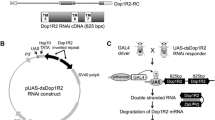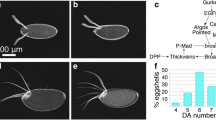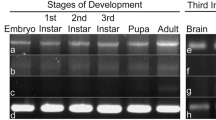Abstract.
Ribonucleases H (RNases H) recognize and specifically degrade RNA that is bound to complementary DNA and are thought to be involved in DNA replication and transcriptional regulation. Though it was previously shown that bacterial RNases H participate in DNA synthesis, none of the known mutations in RNase H genes in either prokaryotes or lower eukaryotes is lethal. Here, we report the characterization of the first loss-of-function mutation in an RNase H1 gene in a metazoan organism, Drosophila melanogaster. Genetic studies of this mutant showed that this gene is essential for metamorphosis in Drosophila. However, disruption of the RNase H1 gene does not affect proliferation, but probably alters the regulation of gene expression. The lethal phenotype of this mutant also demonstrates that RNase H1 activity in Drosophila cannot be provided by other cellular RNase H activities. Analysis of the developmental and spatial expression profiles of a reporter gene placed under the control of the RNase H1 promoter revealed increased expression in several larval tissues. In salivary glands this increase was shown to be inducible by treatment with ecdysone.
Similar content being viewed by others
Author information
Authors and Affiliations
Additional information
Electronic Publication
Rights and permissions
About this article
Cite this article
Filippov, .V., Filippova, .M. & Gill, .S. Drosophila RNase H1 is essential for development but not for proliferation. Mol Gen Genomics 265, 771–777 (2001). https://doi.org/10.1007/s004380100483
Received:
Accepted:
Issue Date:
DOI: https://doi.org/10.1007/s004380100483




